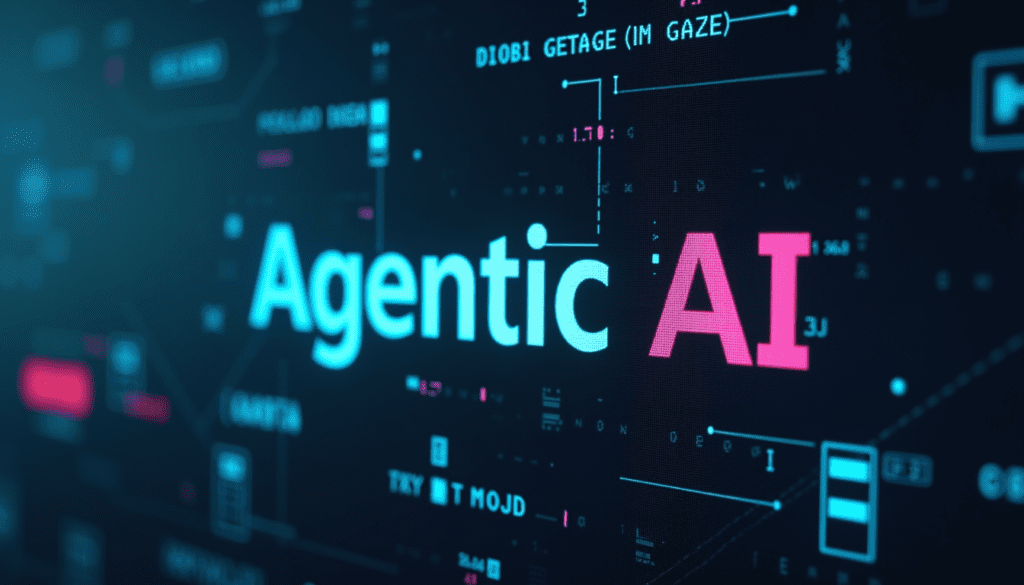Artificial intelligence continues to evolve at a rapid pace, and one of its most transformative developments is Agentic AI. This emerging technology is not just about chatbots or predictive analytics; it represents a leap toward AI systems capable of independently planning and executing complex, multistep tasks with minimal human intervention. By combining the flexibility of foundation models with real-time decision-making and action execution, Agentic AI is changing how organizations view automation and digital collaboration.
What Is Agentic AI And Why It Matters
Agentic AI refers to artificial intelligence agents that can autonomously plan, execute, and adapt workflows. Unlike traditional AI models that only deliver insights or single-step outputs, these agents act as “virtual coworkers,” capable of performing entire processes—from conducting online research and analyzing data to making purchases and generating reports.
For instance, imagine a customer service system that not only answers client queries but also processes refunds, updates inventory, and coordinates with logistics teams, all autonomously. According to the McKinsey Technology Trends Outlook 2025, Agentic AI is one of the fastest-growing trends in enterprise technology, driven by advances in natural language processing, reasoning models, and agent-to-agent communication.
The importance of Agentic AI lies in its ability to:
- Handle a long tail of unpredictable tasks without the need for pre-coded rules.
- Use standard digital tools, just as a human would, including browsers and software applications.
- Receive instructions and feedback in natural language, reducing complexity in system deployment.
- Generate transparent work plans that humans can read, edit, and optimize.
This capability enables organizations to rethink how they allocate resources, streamline operations, and boost productivity, especially in industries like finance, healthcare, cybersecurity, and software development.
Latest Developments In Agentic AI
Agentic AI has moved quickly from concept to application. Key developments include:
General-Purpose Agent Platforms
Companies are releasing platforms that can perform a wide range of digital tasks. For example, OpenAI’s Operator autonomously executes online tasks such as booking flights or managing e-commerce transactions, while Manus AI handles research, writing, and workflow management. Google’s Gemini 2.5 Flash enables browser automation through natural language, making digital interaction easier for developers and enterprises.
Specialized Business Agents
Some Agentic AI applications focus on specific business needs. In cybersecurity, Darktrace uses autonomous agents to monitor and mitigate complex cyberthreats in real time. Salesforce’s Agentforce handles customer support, scheduling, and lead qualification without human intervention, improving efficiency. In software development, tools like Cursor automate code generation, significantly reducing development time.
Deep-Research Knowledge Agents
Knowledge-intensive tasks are also benefiting from Agentic AI. Tools like Perplexity Deep Research autonomously conduct multistep research, evaluate sources, and synthesize information into comprehensive reports. This capability helps industries that rely on rapid and accurate information, such as legal services, market research, and healthcare.
Agent-to-Agent Communication
Agentic AI systems are beginning to communicate with each other using frameworks like Google’s Agent2Agent (A2A) protocol, enabling seamless collaboration across platforms. This multiagent ecosystem allows businesses to run more complex workflows, such as supply chain coordination or talent sourcing, without needing multiple separate systems.
How Agentic AI Is Impacting The Workforce
One of the most debated topics around Agentic AI is its effect on jobs. Job postings related to Agentic AI have increased by more than 900 percent between 2023 and 2024, according to McKinsey. These roles often require advanced technical skills such as Python programming, machine learning, natural language processing, and prompt engineering.
Interestingly, Agentic AI is shifting the nature of work itself. Traditional deterministic programming roles are being replaced by positions focusing on task planning, orchestration, and decision-making. Rather than removing humans from the loop entirely, many organizations are adopting hybrid models where humans manage high-level strategy while AI agents handle operational details.
Key Challenges And Risks
While Agentic AI presents huge potential, it also comes with challenges:
- Trust and Accountability: As agents gain more autonomy, ensuring their decisions are ethical and accurate becomes critical.
- Failure Modes: AI systems can make incorrect decisions if they misinterpret data or operate outside intended boundaries.
- Data Quality and Security: Poor training data or adversarial attacks can compromise system reliability.
- Regulatory Uncertainty: Many legal frameworks are not yet prepared to handle AI systems that make autonomous decisions.
Addressing these challenges requires strong governance frameworks, transparency in decision-making, and a balance between automation and human oversight.
Adoption Outlook And Opportunities
At present, Agentic AI is in an experimentation phase for most organizations, but adoption is expected to accelerate. Industries already exploring applications include:
- Banking and Finance: Automating credit analysis, fraud detection, and customer support.
- Healthcare: Managing patient data, scheduling, and preliminary diagnosis tasks.
- Cybersecurity: Detecting and responding to evolving threats in real time.
- Retail and E-Commerce: Personalizing customer experiences and automating supply chain tasks.
- Software Development: Automating repetitive coding and debugging workflows.
As capabilities mature, businesses that integrate Agentic AI early will likely gain a competitive edge, improving operational efficiency and accelerating innovation.
The Future Of Agentic AI
The future of Agentic AI depends on how companies manage its integration with human teams and ensure ethical deployment. Some key questions moving forward include:
- How will organizations combine human talent and AI agents for maximum productivity?
- What safeguards are needed to ensure reliable and transparent outcomes?
- Will Agentic AI primarily enhance expert talent by automating repetitive tasks, or will it displace broader segments of the workforce?
- How autonomous should AI agents be allowed to operate in critical functions like finance or healthcare?
The answers to these questions will shape how fast and how effectively this technology becomes mainstream.
Read More






 Saturday, 28-02-26
Saturday, 28-02-26







